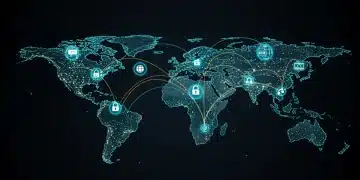Blockchain for Secure Global Data Exchange: A 2025 US Industry Deep Dive

Blockchain technology is poised to redefine secure global data exchange for US industry leaders by 2025, offering enhanced integrity, privacy, and efficiency across diverse operational landscapes.
The landscape of global data exchange is undergoing a profound transformation, with Blockchain for Secure Global Data Exchange: A 2025 Deep Dive for US Industry Leaders (INSIDER KNOWLEDGE) revealing a future where data integrity and privacy are paramount. How will this technology reshape operations for leading US industries? This analysis delves into the critical shifts and strategic insights essential for navigating the evolving digital frontier.
The Emergence of Blockchain in Global Data Exchange
Blockchain technology, once primarily associated with cryptocurrencies, is rapidly maturing into a foundational infrastructure for secure global data exchange. Its decentralized and immutable ledger capabilities are proving invaluable for industries grappling with increasing data volumes and stringent regulatory requirements.
As of late 2024, US industry leaders are actively exploring and piloting blockchain solutions to address long-standing challenges in data sharing, specifically focusing on cross-border transactions and supply chain transparency. The push for enhanced security and verifiable data trails is driving this accelerated adoption.
Addressing Data Security Imperatives
Traditional data exchange methods often rely on centralized systems vulnerable to breaches and manipulation. Blockchain introduces a paradigm shift by distributing data across a network, making it significantly harder for malicious actors to compromise.
- Enhanced Encryption: Data on a blockchain is typically encrypted and linked cryptographically.
- Immutable Records: Once a data block is added, it cannot be altered, ensuring data integrity.
- Decentralized Control: No single entity holds all the data, reducing points of failure.
- Transparent Audit Trails: All transactions are recorded and verifiable by network participants.
Key Drivers for 2025 Adoption in US Industries
Several critical factors are accelerating the integration of blockchain into global data exchange strategies for US industries, particularly as we approach 2025. These drivers range from regulatory pressures to the inherent economic advantages offered by the technology.
The demand for greater transparency in supply chains, coupled with the need to comply with evolving international data privacy laws, makes blockchain an increasingly attractive solution. Businesses are recognizing that proactive adoption can provide a significant competitive edge.
Regulatory Compliance and Data Sovereignty
Global data regulations, such as GDPR and emerging US state-level privacy laws, place immense pressure on companies to manage data securely and transparently. Blockchain offers tools to meet these demands by providing verifiable consent mechanisms and clear data lineage.
Moreover, the concept of data sovereignty, where data is subject to the laws of the country where it is stored, is gaining traction. Blockchain networks can be designed to respect these jurisdictional requirements, facilitating compliant international data transfers.
Transformative Applications Across Sectors
The impact of blockchain on secure global data exchange extends across a diverse array of US industries. From finance to healthcare, the technology is enabling new levels of efficiency, trust, and operational resilience.
In the financial sector, blockchain is streamlining cross-border payments and trade finance, reducing settlement times and costs. Healthcare is leveraging it for secure patient record management and drug traceability, ensuring data privacy and combating counterfeiting.
Supply Chain Optimization and Transparency
One of the most prominent applications is in supply chain management. Blockchain provides an unalterable record of a product’s journey from origin to consumer, enhancing transparency and accountability.
- Real-time Tracking: Monitor goods in transit with unprecedented accuracy.
- Fraud Prevention: Verify the authenticity of products and components.
- Efficiency Gains: Automate processes with smart contracts, reducing manual errors.
- Sustainability Verification: Trace ethical sourcing and environmental compliance.

Challenges and Considerations for Implementation
Despite its vast potential, the widespread adoption of blockchain for secure global data exchange is not without its hurdles. US industry leaders must navigate technical complexities, interoperability issues, and the need for significant organizational change management.
Scalability remains a key concern for many enterprise-level applications, though ongoing advancements in layer-2 solutions and new consensus mechanisms are addressing these limitations. The energy consumption of certain blockchain protocols also warrants consideration.
Overcoming Interoperability Barriers
For blockchain to truly revolutionize global data exchange, different blockchain networks must be able to communicate and share data seamlessly. Achieving this interoperability is crucial for creating a truly interconnected ecosystem.
Industry consortia and standards bodies are actively working on developing common protocols and frameworks to facilitate cross-chain communication. This collaborative effort is essential for breaking down silos and fostering a more integrated digital economy.
Strategic Advantages for Early Adopters
US companies that embrace blockchain for secure global data exchange early are poised to gain significant strategic advantages. These benefits extend beyond mere technological adoption, impacting market positioning, operational efficiency, and customer trust.
Early adopters can establish themselves as leaders in data security and transparency, differentiating their brands in a competitive global marketplace. This proactive stance can also lead to optimized operational costs and reduced risks associated with data breaches.
Building Trust and Reputation
In an era where data breaches are common and consumer trust is fragile, blockchain offers a powerful tool for rebuilding and maintaining confidence. By demonstrating a commitment to data integrity, companies can strengthen their reputation.
This enhanced trust can translate into stronger customer loyalty, improved partnerships, and a more resilient business ecosystem. Transparency built on blockchain is becoming a hallmark of responsible corporate governance.
The Road Ahead: 2025 and Beyond
Looking towards 2025, the trajectory for blockchain in secure global data exchange for US industry leaders is one of continued growth and integration. We anticipate a maturation of enterprise-grade solutions and a broader understanding of the technology’s nuanced applications.
The focus will shift from experimental pilots to scaled deployments, with an emphasis on creating robust, interconnected blockchain ecosystems. Collaboration between industry, government, and technology providers will be crucial in shaping this future.
Emerging Trends and Innovations
Innovations such as zero-knowledge proofs (ZKPs) will further enhance data privacy by allowing verification of information without revealing the underlying data itself. Quantum-resistant cryptography is also on the horizon, preparing blockchain for future computational challenges.
The convergence of blockchain with other emerging technologies like AI and IoT will unlock even more sophisticated solutions for data management and security. This synergy will create intelligent, self-executing systems that can manage complex global data flows with minimal human intervention.
| Key Point | Brief Description |
|---|---|
| Immutable Data Records | Blockchain ensures that once data is recorded, it cannot be altered, significantly boosting data integrity and trust. |
| Enhanced Security & Privacy | Decentralized architecture and advanced cryptography protect sensitive global data from breaches and unauthorized access. |
| Operational Efficiency | Automation via smart contracts and streamlined processes reduce costs and accelerate global data exchange operations. |
| Regulatory Compliance | Blockchain facilitates adherence to complex international data regulations, offering verifiable consent and data lineage. |
Frequently Asked Questions About Blockchain for Global Data Exchange
Blockchain’s primary benefit is fostering unparalleled trust and security in global data exchange. Its decentralized and immutable ledger ensures data integrity and transparency, minimizing fraud and unauthorized alterations across international borders.
Blockchain enhances data privacy through advanced cryptographic techniques and selective data visibility. Participants can share verified information without revealing sensitive underlying data, crucial for compliance with diverse international privacy regulations like GDPR.
The financial services, supply chain and logistics, and healthcare sectors in the US are currently leading the adoption. These industries benefit significantly from blockchain’s ability to secure transactions, track goods, and manage sensitive patient data globally.
Key challenges include scalability limitations, interoperability issues between different blockchain networks, and the need for standardized regulatory frameworks. Overcoming these requires significant technological development and collaborative industry efforts.
By 2025, smart contracts will automate and enforce agreements in global data exchange, reducing manual intervention and increasing efficiency. They will ensure predefined conditions are met for data sharing, payments, and compliance, enhancing trust and speed.
Looking Ahead
The ongoing evolution of blockchain technology signals a pivotal shift for secure global data exchange, positioning the United States not just as a participant but as a key architect in this digital transformation. As industries move toward decentralized frameworks, the demand for tamper-proof data auditability, transparent transactional layers, and trustless verification models will intensify. This momentum suggests that blockchain will increasingly serve as the backbone of international commerce, supply chain coordination, and cross-border regulatory compliance.
In 2025, the convergence of blockchain with AI-driven automation will likely enable fully adaptive data networks capable of real-time threat detection and autonomous validation. Exploring peer-reviewed research on blockchain resilience like https://www.sciencedirect.com/science/article/pii/S2667345223000330 offers deeper insight into how these hybrid systems are being engineered to withstand complex cybersecurity challenges. These innovations underscore a shift from speculative blockchain dialogue toward tangible, large-scale deployment strategies grounded in security and interoperability.
Ultimately, blockchain’s long-term relevance will be defined not just by technological capability but by its ability to embed trust into digital infrastructure at a global scale. By prioritizing verifiable data integrity, modular integration, and secure AI-enhanced protocols, industry leaders can ensure that blockchain evolves into a foundational pillar of the next era of international digital collaboration.





